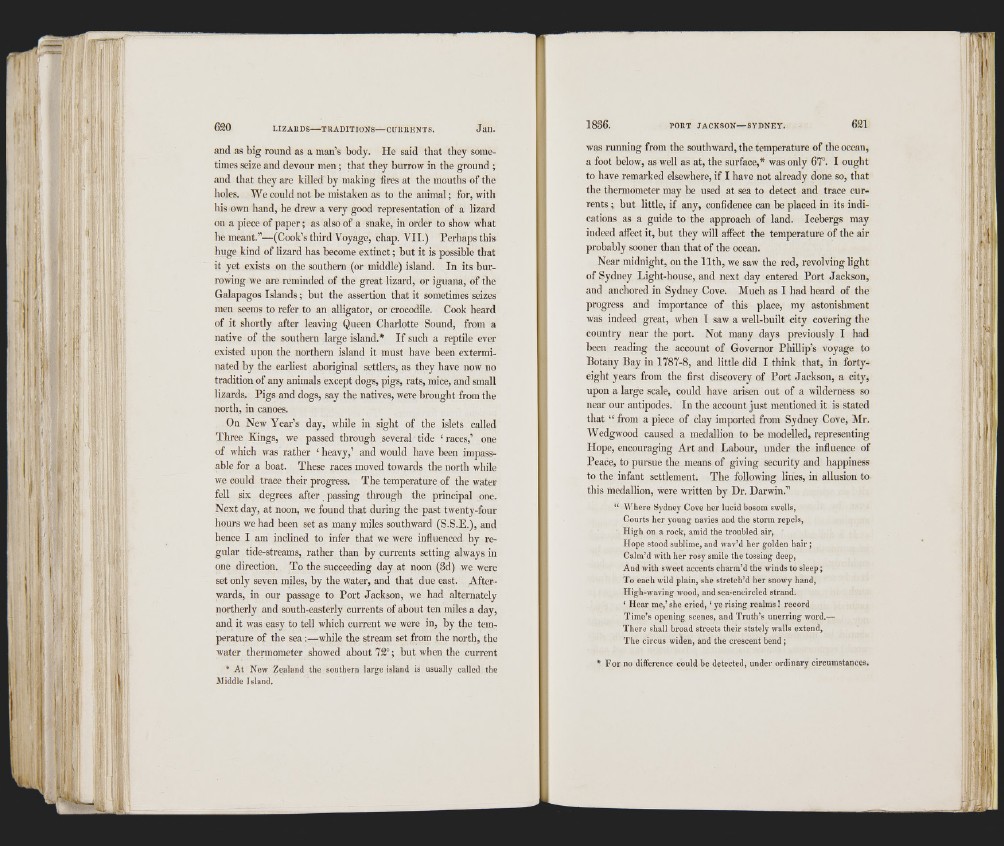
I
I;,
\ !
I » fi
Iii air
and as big round as a man’s body. He said that they sometimes
seize and devour men ; that they burrow in the ground ;
and that they are killed by making fires at the mouths of the
holes. We could not be mistaken as to the animal; for, with
his own hand, he drew a very good representation of a lizard
on a piece of paper; as also of a snake, in order to show what
lie meant.”—(Cook’s third Voyage, chap. VII.) Perhaps this
huge kind of lizard has become extinct; but it is possible that
it yet exists on the southern (or middle) island. In its burrowing
we are reminded of the great lizard, or iguana, of the
Galapagos Islands; but the assertion that it sometimes seizes
men seems to refer to an alligator, or crocodile. Cook heard
of it shortly after leaving Queen Charlotte Sound, from a
native of the southern large island.* If such a reptile ever
existed upon the northern island it must have been exterminated
by the earliest aboriginal settlers, as they have now no
tradition of any animals except dogs, pigs, rats, mice, and small
lizards. Pigs and dogs, say the natives, were brought from the
north, in canoes.
On New Year’s day, while in sight of the islets called
Three Kings, we passed through several tide ‘ races,’ one
of which was rather ‘ heavy,’ and would have heen impassable
for a boat. These races moved towards the north while
we could trace their progress. The temperature of the water
fell six degrees after passing through the principal one.
Next day, at noon, we found that during the past twenty-four
hours we had been set as many miles southward (S.S.E.), and
hence I am inclined to infer that we were influenced by regular
tide-streams, rather than by currents setting always in
one direction. To the succeeding day at noon (3d) we were
set only seven miles, by the water, and that due east. Afterwards,
in our passage to Port Jackson, we had alternately
northerly and south-easterly currents of ahout ten miles a day,
and it was easy to tell which current we were in, hy the temperature
of the sea :—while the stream set from the north, the
water thermometer showed about 72°; but when the current
* At New Zealand the southern large island is usually called the
Middle Island.
was running from the southward, the temperature of the ocean,
a foot below, as well as at, the surface,* was only 67°. I ought
to have remarked elsewhere, if I have not already done so, that
the thermometer may be used at sea to detect and trace currents
; but little, if any, confidence can be placed in its indications
as a guide to the approach of land. Icebergs may
indeed affect it, but they will affect the temperature of the air
probably sooner than that of the ocean.
Near midnight, on the Ilth , we saw the red, revolving light
of Sydney Light-house, and next day entered Port Jackson,
and anchored in Sydney Cove. Much as I had heard of the
progress and importance of this place, my astonishment
was indeed great, when I saw a well-built city covering the
country near the port. Not many days previously I had
heen reading the account of Governor Phillip’s voyage to
Botany Bay in 1787-8, and little did I think that, in forty-
eight years from the first discovery of Port Jackson, a city,
upon a large scale, could have arisen out of a wilderness so
near our antipodes. In the account just mentioned it is stated
that “ from a piece of clay imported from Sydney Cove, Mr.
Wedgwood caused a medallion to be modelled, representing
Hope, encouraging Art and Labour, under the influence of
Peace, to pursue the means of giving security and happiness
to the infant settlement. The following lines, in allusion to
this medallion, were written hy Dr. Darwin.”
“ Where iSj'dney Cove her lucid bosom swells,
Courts her young navies and the storm repels,
High on a rock, amid the troubled air,
Hope stood sublime, and wav’d her golden hair ;
Calm’d with her rosy smile the tossing deep,
And with sweet accents charm’d the winds to sleep ;
To each wild plain, she stretch’d her snowy hand,
High-waving wood, and sea-encircled strand.
‘ Hear me,’ she cried, ‘ ye rising realms! record
Time’s opening scenes, and Truth’s unerring word.—
There shall broad streets their stately walls extend,
The circus widen, and the crescent bend;
* For no difference could be detected, under ordinary circumstances.
if
l !
t iH
ii
1.1»
Iii
! i’ i 1